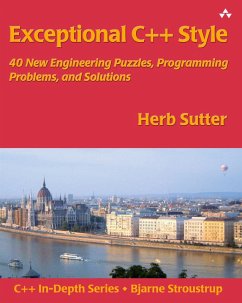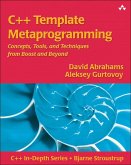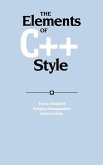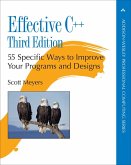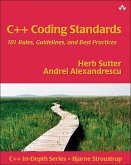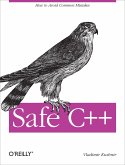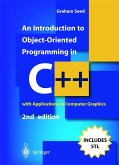C++ guru Herb Sutter provides a thorough and pragmatic understanding of the language while showing how to write exceptional code in C++.
Organized in a practical problem-and-solution format, this book provides successful strategies for solving real-world problems in C++.
Latest addition to Bjarne Stroustrup's respected C++ In-Depth Series.
Sutter is a leading authority on C++ software development; he is chair of the C++ standards committee and is an architect and C++ evangelist at Microsoft.
Exceptional C++ Style continues where Exceptional C++ and More Exceptional C++ left off. This book follows in the tradition of the first two: It delivers new material, organized in bite-sized Items and grouped into themed sections. Readers of the first two books will find some familiar section themes, now including new material, such as exception safety, generic programming, and optimization and memory management techniques. The books overlap in structure and theme, not in content. This book continues the strong emphasis on generic programming and on using the C++ standard library effectively, including coverage of important template and generic programming techniques. Sutter's goal for this third and final book in his set is to present case studies that pull together themes from the previous books. This book also covers important points presented at the C++ Standard Committee where corrections to the Standard have been discussed and accepted. Product Description
Software style is about finding the perfect balance between overhead and functionality... elegance and maintainability... flexibility and excess. In Exceptional C++ Style, legendary C++ guru Herb Sutter presents 40 new programming scenarios designed to analyze not only the what but the why and help you find just the right balance in your software.
Organized around practical problems and solutions, this book offers new insight into crucial C++ details and interrelationships, and new strategies for today's key C++ programming techniques--including generic programming, STL, exception safety, and more. You'll find answers to questions like:
What can you learn about library design from the STL itself?
How do you avoid making templated code needlessly non-generic?
Why shouldn't you specialize function templates? What should you do instead?
How does exception safety go beyond try and catch statements?
Should you use exception specifications, or not?
When and how should you leak the private parts of a class?
How do you make classes safer for versioning?
What's the real memory cost of using standard containers?
How can using const really optimize your code?
How does writing inline affect performance?
When does code that looks wrong actually compile and run perfectly, and why should you care?
What's wrong with the design of std::string?
Exceptional C++ Style will help you design, architect, and code with style--and achieve greater robustness and performance in all your C++ software.
Backcover
Software style is about finding the perfect balance between overhead and functionality... elegance and maintainability... flexibility and excess. In Exceptional C++ Style, legendary C++ guru Herb Sutter presents 40 new programming scenarios designed to analyze not only the what but the why and help you find just the right balance in your software.
Organized around practical problems and solutions, this book offers new insight into crucial C++ details and interrelationships, and new strategies for today's key C++ programming techniques--including generic programming, STL, exception safety, and more. You'll find answers to questions like:
What can you learn about library design from the STL itself?
How do you avoid making templated code needlessly non-generic?
Why shouldn't you specialize function templates? What should you do instead?
How does exception safety go beyond try and catch statements?
Should you use exception specifications, or not?
When and how should you leak the private parts of a class?
How do you make classes safer for versioning?
What's the real memory cost of using standard containers?
How can using const really optimize your code?
How does writing inline affect performance?
When does code that looks wrong actually compile and run perfectly, and why should you care?
What's wrong with the design of std::string?
Exceptional C++ Style will help you design, architect, and code with style--and achieve greater robustness and performance in all your C++ software.
Preface.
GENERIC PROGRAMMING AND THE C++ STANDARD LIBRARY.
1. Uses and Abuses of vector.
2. The String Formatters of Manor Farm, Part 1: sprintf.
3. The String Formatters of Manor Farm, Part 2: Standard (or Blindingly Elegant) Alternatives.
4. Standard Library Member Functions.
5. Flavors of Genericity, Part 1: Covering the Basis [sic].
6. Flavors of Genericity, Part 2: Generic Enough?
7. Why Not Specialize Function Templates?
8. Befriending Templates.
9. Export Restrictions, Part 1: Fundamentals.
10. Export Restrictions, Part 2: Interactions, Usability Issues, and Guidelines.
EXCEPTION SAFETY ISSUES AND TECHNIQUES.
11. Try and Catch Me.
12. Exception Safety: Is It Worth It?
13. A Pragmatic Look at Exception Specifications.
CLASS DESIGN, INHERITANCE, AND POLYMORPHISM.
14. Order, Order!
15. Uses and Abuses of Access Rights.
16. (Mostly) Private.
17. Encapsulation.
18. Virtuality.
19. Enforcing Rules for Derived Classes.
MEMORY AND RESOURCE MANAGEMENT.
20. Containers in Memory, Part 1: Levels of Memory Management.
21. Containers in Memory, Part 2: How Big Is It Really?
22. To new, Perchance to throw, Part 1: The Many Faces of new.
23. To new, Perchance to throw, Part 2: Pragmatic Issues in Memory Management.
OPTIMIZATION AND EFFICIENCY.
24. Constant Optimization?
25. inline Redux.
26. Data Formats and Efficiency, Part 1: When Compression Is the Name of the Game.
27. Data Formats and Efficiency, Part 2: (Even Less) Bit-Twiddling.
TRAPS, PITFALLS, AND PUZZLERS.
28. Keywords That Aren't (or, Comments by Another Name).
29. Is It Initialization?
30. double or Nothing.
31. Amok Code.
32. Slight Typos? Graphic Language and Other Curiosities.
33. Operators, Operators Everywhere.
STYLE CASE STUDIES.
34. Index Tables.
35. Generic Callbacks.
36. Construction Unions.
37. Monoliths Unstrung, Part 1: A Look at std::string.
38. Monoliths Unstrung, Part 2: Refactoring std::string.
39. Monoliths Unstrung, Part 3: std::string Diminishing.
40. Monoliths Unstrung, Part 4: std::string Redux.
Bibliography.
Index.
Software style is about finding the perfect balance between overhead and functionality... elegance and maintainability... flexibility and excess. In Exceptional C++ Style , legendary C++ guru Herb Sutter presents 40 new programming scenarios designed to analyze not only the what but the why and help you find just the right balance in your software.
Organized around practical problems and solutions, this book offers new insight into crucial C++ details and interrelationships, and new strategies for today's key C++ programming techniques--including generic programming, STL, exception safety, and more. You'll find answers to questions like:
What can you learn about library design from the STL itself?
How do you avoid making templated code needlessly non-generic?
Why shouldn't you specialize function templates? What should you do instead?
How does exception safety go beyond try and catch statements?
Should you use exception specifications, or not?
When and how should you leakthe private parts of a class?
How do you make classes safer for versioning?
What's the real memory cost of using standard containers?
How can using const really optimize your code?
How does writing inline affect performance?
When does code that looks wrong actually compile and run perfectly, and why should you care?
What's wrong with the design of std::string?
Exceptional C++ Style will help you design, architect, and code with style--and achieve greater robustness and performance in all your C++ software.
Organized in a practical problem-and-solution format, this book provides successful strategies for solving real-world problems in C++.
Latest addition to Bjarne Stroustrup's respected C++ In-Depth Series.
Sutter is a leading authority on C++ software development; he is chair of the C++ standards committee and is an architect and C++ evangelist at Microsoft.
Exceptional C++ Style continues where Exceptional C++ and More Exceptional C++ left off. This book follows in the tradition of the first two: It delivers new material, organized in bite-sized Items and grouped into themed sections. Readers of the first two books will find some familiar section themes, now including new material, such as exception safety, generic programming, and optimization and memory management techniques. The books overlap in structure and theme, not in content. This book continues the strong emphasis on generic programming and on using the C++ standard library effectively, including coverage of important template and generic programming techniques. Sutter's goal for this third and final book in his set is to present case studies that pull together themes from the previous books. This book also covers important points presented at the C++ Standard Committee where corrections to the Standard have been discussed and accepted. Product Description
Software style is about finding the perfect balance between overhead and functionality... elegance and maintainability... flexibility and excess. In Exceptional C++ Style, legendary C++ guru Herb Sutter presents 40 new programming scenarios designed to analyze not only the what but the why and help you find just the right balance in your software.
Organized around practical problems and solutions, this book offers new insight into crucial C++ details and interrelationships, and new strategies for today's key C++ programming techniques--including generic programming, STL, exception safety, and more. You'll find answers to questions like:
What can you learn about library design from the STL itself?
How do you avoid making templated code needlessly non-generic?
Why shouldn't you specialize function templates? What should you do instead?
How does exception safety go beyond try and catch statements?
Should you use exception specifications, or not?
When and how should you leak the private parts of a class?
How do you make classes safer for versioning?
What's the real memory cost of using standard containers?
How can using const really optimize your code?
How does writing inline affect performance?
When does code that looks wrong actually compile and run perfectly, and why should you care?
What's wrong with the design of std::string?
Exceptional C++ Style will help you design, architect, and code with style--and achieve greater robustness and performance in all your C++ software.
Backcover
Software style is about finding the perfect balance between overhead and functionality... elegance and maintainability... flexibility and excess. In Exceptional C++ Style, legendary C++ guru Herb Sutter presents 40 new programming scenarios designed to analyze not only the what but the why and help you find just the right balance in your software.
Organized around practical problems and solutions, this book offers new insight into crucial C++ details and interrelationships, and new strategies for today's key C++ programming techniques--including generic programming, STL, exception safety, and more. You'll find answers to questions like:
What can you learn about library design from the STL itself?
How do you avoid making templated code needlessly non-generic?
Why shouldn't you specialize function templates? What should you do instead?
How does exception safety go beyond try and catch statements?
Should you use exception specifications, or not?
When and how should you leak the private parts of a class?
How do you make classes safer for versioning?
What's the real memory cost of using standard containers?
How can using const really optimize your code?
How does writing inline affect performance?
When does code that looks wrong actually compile and run perfectly, and why should you care?
What's wrong with the design of std::string?
Exceptional C++ Style will help you design, architect, and code with style--and achieve greater robustness and performance in all your C++ software.
Preface.
GENERIC PROGRAMMING AND THE C++ STANDARD LIBRARY.
1. Uses and Abuses of vector.
2. The String Formatters of Manor Farm, Part 1: sprintf.
3. The String Formatters of Manor Farm, Part 2: Standard (or Blindingly Elegant) Alternatives.
4. Standard Library Member Functions.
5. Flavors of Genericity, Part 1: Covering the Basis [sic].
6. Flavors of Genericity, Part 2: Generic Enough?
7. Why Not Specialize Function Templates?
8. Befriending Templates.
9. Export Restrictions, Part 1: Fundamentals.
10. Export Restrictions, Part 2: Interactions, Usability Issues, and Guidelines.
EXCEPTION SAFETY ISSUES AND TECHNIQUES.
11. Try and Catch Me.
12. Exception Safety: Is It Worth It?
13. A Pragmatic Look at Exception Specifications.
CLASS DESIGN, INHERITANCE, AND POLYMORPHISM.
14. Order, Order!
15. Uses and Abuses of Access Rights.
16. (Mostly) Private.
17. Encapsulation.
18. Virtuality.
19. Enforcing Rules for Derived Classes.
MEMORY AND RESOURCE MANAGEMENT.
20. Containers in Memory, Part 1: Levels of Memory Management.
21. Containers in Memory, Part 2: How Big Is It Really?
22. To new, Perchance to throw, Part 1: The Many Faces of new.
23. To new, Perchance to throw, Part 2: Pragmatic Issues in Memory Management.
OPTIMIZATION AND EFFICIENCY.
24. Constant Optimization?
25. inline Redux.
26. Data Formats and Efficiency, Part 1: When Compression Is the Name of the Game.
27. Data Formats and Efficiency, Part 2: (Even Less) Bit-Twiddling.
TRAPS, PITFALLS, AND PUZZLERS.
28. Keywords That Aren't (or, Comments by Another Name).
29. Is It Initialization?
30. double or Nothing.
31. Amok Code.
32. Slight Typos? Graphic Language and Other Curiosities.
33. Operators, Operators Everywhere.
STYLE CASE STUDIES.
34. Index Tables.
35. Generic Callbacks.
36. Construction Unions.
37. Monoliths Unstrung, Part 1: A Look at std::string.
38. Monoliths Unstrung, Part 2: Refactoring std::string.
39. Monoliths Unstrung, Part 3: std::string Diminishing.
40. Monoliths Unstrung, Part 4: std::string Redux.
Bibliography.
Index.
Software style is about finding the perfect balance between overhead and functionality... elegance and maintainability... flexibility and excess. In Exceptional C++ Style , legendary C++ guru Herb Sutter presents 40 new programming scenarios designed to analyze not only the what but the why and help you find just the right balance in your software.
Organized around practical problems and solutions, this book offers new insight into crucial C++ details and interrelationships, and new strategies for today's key C++ programming techniques--including generic programming, STL, exception safety, and more. You'll find answers to questions like:
What can you learn about library design from the STL itself?
How do you avoid making templated code needlessly non-generic?
Why shouldn't you specialize function templates? What should you do instead?
How does exception safety go beyond try and catch statements?
Should you use exception specifications, or not?
When and how should you leakthe private parts of a class?
How do you make classes safer for versioning?
What's the real memory cost of using standard containers?
How can using const really optimize your code?
How does writing inline affect performance?
When does code that looks wrong actually compile and run perfectly, and why should you care?
What's wrong with the design of std::string?
Exceptional C++ Style will help you design, architect, and code with style--and achieve greater robustness and performance in all your C++ software.

